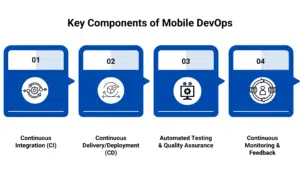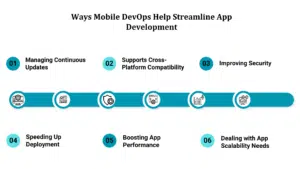Do you know more than 50% of all companies are now adopting DevOps practices in building mobile apps. It indicates that the future of building mobile apps depends upon continuous integration and continuous delivery.
Mobile DevOps specifically is not just about building a highly functional app, but is about creating a secure, scalable, and robust product, capable of quickly adhering to the user demands or market fluctuations.
In simple words, Mobile DevOps is a well-curated extension of the standard DevOps methodology. This approach is tailored for developers to address the unique challenges or complexities faced in developing, testing, and delivering mobile apps.
In this article, we will be learning about what is DevOps for mobile apps and how it bridges the noticeable gap between IT operations and development environments.
Key Components of Mobile DevOps
To start with, here is a brief overview of the key components that comprise mobile DevOps:

1. Continuous Integration (CI):
It is the process that ensures all the code changes made for a mobile app are tested continually and automatically, followed by integration into the primary branch. Thus, it will reduce the overall risk of future bugs and prolonged maintenance.
2. Continuous Delivery/Deployment (CD):
This is the process that automates the app release process, ensuring all the updates are delivered to end-users quickly and more reliably. It will manage the app release process for App Store or Google Play store and the test environments like Firebase and Testflight.
3. Automated Quality Analysis or Testing:
Mobile DevOps can enable automated execution of test cases for the app on diverse platforms like iOS and Android. It will ensure that the compatibility and performance of your app are consistent across all devices like smartphones and tablets. Experts make use of tools like Appium, GitLab, Selenium and others for encouraging continuous testing or quality analysis as part of Mobile DevOps.
4. Monitoring & Feedback:
As part of MobileDevOps, experts make use of dedicated tools for automating the process of continually monitoring the performance of the application and gather feedback for resolving potential issues faster. Datadog, Splunk, Prometheus, Jenkins and others are a few of the monitoring & feedback tools that developers use for adopting Mobile DevOps.
How is Mobile DevOps Different From Traditional DevOps?
Mobile DevOps differs from the traditional counterpart as the former is meant to address even the minute complexities in mobile ecosystems. The traditional DevOps is preferable for software of all types, whereas Mobile DevOps is brought to practice, specifically for addressing unique mobile app development challenges.
The two areas that Mobile DevOps focuses on above traditional DevOps include:
-
Platform-Specific Limitations
Mobile app developers often encounter challenges such as device fragmentation, performance optimization for constrained environments, APIs, and more. Such situations often become more restricted to address for developers, because of the strict development & distribution processes imposed by Google and Apple.
Mobile DevOps is meant to overcome such obstacles through automation of the routine tasks like App Store/Play Store submissions, cross-platform compilation, complex code signing, Beta testing and others. Thus, it will simplify the overall process of adhering to platform requirements, mitigate the post-release mobile app fixes, and enable smooth releases.
-
Shift-Left Approach
The key aspect of implementing Mobile DevOps is to emphasize shift-left approach. This process is meant for testing & quality assurance, right at the early stages of the development lifecycle. It is a cost-effective approach for avoiding faulty app releases and dealing with expensive post-release fixes.
The purpose of the shift-left Mobile DevOps approach is to boost the user satisfaction quotient and scale the retention rate, reducing the number of app uninstalls. Mobile DevOps prioritizes early checks and validation for quality and performance, ensuring a better user experience and avoidance of post-deployment corrections.
In What Ways Does Mobile DevOps Help Professionals Build Robust Apps?
Here are some of the ways through which Mobile DevOps proves itself reliable and effective for mobile app development:
1. Managing Continuous Updates:
In order to ensure a mobile app continues to deliver consistent performance with next-gen features, it requires frequent updates. The app updates often address the changing user preferences, new device launches, and OS updates.
With a traditional development approach, you can possibly struggle with the frequency and speed of releasing those updates. On the other hand, Mobile DevOps makes use of CI and CD pipelines for automating & accelerating the launch of app updates.
2. Supports Cross-Platform Compatibility:
With MobileDevOps, developers get an environment where the code gets tested continually on real devices like smartphones or tablets and virtual environments specific to Android and iOS platforms. This way, when you are building apps to make them run seamlessly on both iOS and Android platforms, Mobile DevOps can provide you with the assurance that they will deliver the best user experience.
Certain apps like Calabas or Appium are used as part of Mobile DevOps for simulating different testing environments. Implementing such practices can ensure your mobile app works without flaws, irrespective of the OS or device people use for accessing it.
3. Improving Security:
Cyber attacks, data breaches, and other such threats are evident and common in mobile app development. With the use of Mobile DevOps practices, developers can now seamlessly integrate security patches throughout the development lifecycle.
Automated security checks, such as penetration testing, vulnerability scans, code analysis, and others, are executed continually. Following that, all the potential issues are fixed in real-time, which will reduce the overall likelihood of security breaches.
4. Speeding up the Deployment:
In the competitive app-driven business environment, the overall time-to-market can create a big impact on success or failure of your operations. Mobile DevOps is meant to accelerate the overall app development process through improved team collaboration, automation of redundant tasks, and advanced tools.
With use of platforms like Azure DevOps, Jenkins, Bitrise and others, developers can automate the entire pipeline from coding to deployment stage. Thus, the overall mobile app development workflow gets streamlined, encouraging faster work execution. It enables businesses to launch their apps faster and quickly embark on market opportunities.
5. Boosting App Performance:
Slow loading, frequent app crashes, and other such performance issues can lead to poor user experience and loss of revenue. Developers leverage the potential of Mobile DevOps and use diverse performance monitoring tools like Apache JMeter, LoadRunner and others, to keep a tab on the app functionalities.
Developers integrate such tools into the CI/CD pipelines and enable continuous monitoring of all potential performance loopholes. Early detection will enable teams to fix the app codebase and boost the overall speed and stability.
6. Dealing with App Scalability Needs:
Trending mobile apps often experience a rapid surge in usage, mostly because of viral trends, events, or promotions. All the traditional backend infrastructures might struggle to scale up the app functionalities for dealing with increased demand from users.
On the other hand, Mobile DevOps uses the IaC (Infrastructure as Code) method for enabling dynamic resource allocation for the app. This way, your mobile application can scale in real-time, depending on the user’s needs. With Mobile DevOps, your app will remain responsive and stable under continually varying loads.
How Can Simpalm Assist You in Implementing Mobile DevOps?
Simpalm is a leading mobile app development company, with a team of 100+ proficient developers and a successful record of 400+ high-performance deployments. We adopt Mobile DevOps for every project we build, ensuring you get the required performance, user experience, scalability, and security from your app.
Our team makes use of modern-day technologies and tools to implement DevOps in mobile development. From design & development to deployment & post-launch maintenance and updates, we streamline every stage of the app development lifecycle.
At Simpalm, our Mobile DevOps team can help you achieve:
- Assessment and planning of Mobile DevOps.
- Implement process automation for streamlining the entire process pipeline, from performance to QA testing and beyond.
- Test the app on diverse platforms and devices.
- Provide CI & CD pipelines for ensuring the apps are always updated.
- Implement security, performance, and usability testing.
To know more about our mobile app development services, powered by Mobile DevOps, connect with us today!

 App Development
App Development Web Engineering
Web Engineering AI Services
AI Services Health / Fitness
Health / Fitness Education
Education Social
Social Nonprofit
Nonprofit Fintech
Fintech Logistics
Logistics Government
Government HR Software
HR Software About Simpalm
About Simpalm Our News
Our News Client Testimonials
Client Testimonials Careers
Careers Awards
Awards Resources
Resources Information
Information




